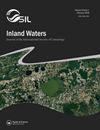北极三角洲湖泊对洪水变化的湖沼学响应
IF 2.3
3区 环境科学与生态学
Q1 LIMNOLOGY
引用次数: 0
摘要
全球气候变化正在迅速改变北极淡水,对水文、生物地球化学和生态学产生影响,但在许多情况下,人们对这些变化的轨迹知之甚少。我们从麦肯齐三角洲(加拿大北部)的湖泊中收集了一个独特的5年主要离子、营养物质和微量金属数据序列,以检查在可变洪水条件下的湖泊学变化,包括近年来历史上最高和最低峰值的河流水位。先前在麦肯齐三角洲的工作已经确定,湖水化学与春季冰堵塞洪水期间与河流的连接时间密切相关,或者在生长季节通过通道连接。我们表明,春季峰值水位的差异解释了夏季与河道隔离的湖泊的湖泊化学差异。麦肯齐三角洲中孤立的、富含大型植物的湖泊在夏季被证明是二氧化碳的吸收者。我们展示了与河流连通性最大的孤立湖泊中与大型植物生产力相关的变量对洪水状况变化的响应,这表明生产力随着连接时间的增加而下降。据预测,低海拔湖泊的连通性将随着气候变化而增加,这些湖泊占麦肯齐三角洲湖泊数量和面积的大部分。我们的研究表明,连接时间的增加可能会降低这些湖泊的大型植物生产力,对单个湖泊和整个麦肯齐三角洲的二氧化碳平衡产生潜在影响。本文章由计算机程序翻译,如有差异,请以英文原文为准。
The limnological response of Arctic deltaic lakes to alterations in flood regime
ABSTRACT Arctic freshwaters are being rapidly altered by global climate change with consequences to hydrology, biogeochemistry, and ecology, but in many cases the trajectory of these changes is poorly understood. We collected a unique 5-year time series of major ion, nutrient, and trace metal data from lakes in the Mackenzie Delta (NT, Canada) to examine limnological changes during a period of variable flood conditions, including years of recent historic high and low peak river levels. Previous work in the Mackenzie Delta has established that lake water chemistry is strongly related to connection time with the river during the period of spring ice-jam flooding or via channel connections through the growing season. We show that differences in peak spring water levels explain differences in lake chemistry in lakes isolated from the channel during the summer. Isolated, macrophyte-rich lakes in the Mackenzie Delta have been shown to be CO2 absorbers during summer. We demonstrate a response to alterations in flood regime by variables related to macrophyte productivity in isolated lakes with the greatest connectivity to the river that suggests productivity declines with increasing connection time. The connectivity of low-elevation lakes, which represent a majority of lake number and area in the Mackenzie Delta, has been projected to increase with climate change. Our work suggests that an increase in connection time may decrease the macrophyte productivity of these lakes, with potential consequences to the CO2 balance of individual lakes and the Mackenzie Delta as a whole.
求助全文
通过发布文献求助,成功后即可免费获取论文全文。
去求助
来源期刊

Inland Waters
LIMNOLOGY-MARINE & FRESHWATER BIOLOGY
CiteScore
6.10
自引率
9.70%
发文量
34
审稿时长
>12 weeks
期刊介绍:
Inland Waters is the peer-reviewed, scholarly outlet for original papers that advance science within the framework of the International Society of Limnology (SIL). The journal promotes understanding of inland aquatic ecosystems and their management. Subject matter parallels the content of SIL Congresses, and submissions based on presentations are encouraged.
All aspects of physical, chemical, and biological limnology are appropriate, as are papers on applied and regional limnology. The journal also aims to publish articles resulting from plenary lectures presented at SIL Congresses and occasional synthesis articles, as well as issues dedicated to a particular theme, specific water body, or aquatic ecosystem in a geographical area. Publication in the journal is not restricted to SIL members.
 求助内容:
求助内容: 应助结果提醒方式:
应助结果提醒方式:


